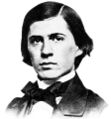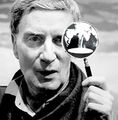Template:Selected anniversaries/April 19: Difference between revisions
Jump to navigation
Jump to search
No edit summary |
No edit summary |
||
| Line 25: | Line 25: | ||
||Charles Ehresmann (b. 19 April 1905) was a French mathematician who worked in differential topology and category theory. He was an early member of the Bourbaki group, and is known for his work on the differential geometry of smooth fiber bundles, notably the Ehresmann connection, the concept of jets of a smooth map, and his seminar on category theory. | ||Charles Ehresmann (b. 19 April 1905) was a French mathematician who worked in differential topology and category theory. He was an early member of the Bourbaki group, and is known for his work on the differential geometry of smooth fiber bundles, notably the Ehresmann connection, the concept of jets of a smooth map, and his seminar on category theory. | ||
||Conel Hugh O'Donel Alexander (b. 19 April 1909), known as Hugh Alexander and C. H. O'D. Alexander as a pen name, was an Irish-born British cryptanalyst, chess player, and chess writer. He worked on the German Enigma machine at Bletchley Park during the Second World War, and was later the head of the cryptanalysis division at GCHQ for 25 years. Pic. | |||
File:Glenn Seaborg.jpg|link=Glenn T. Seaborg (nonfiction)|1912: Chemist [[Glenn T. Seaborg (nonfiction)|Glenn T. Seaborg]] born. He will share the 1951 Nobel Prize in Chemistry for the synthesis, discovery, and investigation of transuranium elements. | File:Glenn Seaborg.jpg|link=Glenn T. Seaborg (nonfiction)|1912: Chemist [[Glenn T. Seaborg (nonfiction)|Glenn T. Seaborg]] born. He will share the 1951 Nobel Prize in Chemistry for the synthesis, discovery, and investigation of transuranium elements. | ||
Revision as of 05:09, 1 April 2018
1572: New method for predicting lottery winners reveals new class of crimes against mathematical constants.
1912: Chemist Glenn T. Seaborg born. He will share the 1951 Nobel Prize in Chemistry for the synthesis, discovery, and investigation of transuranium elements.
1913: Havelock and Tesla Research Telecommunication wins Pulitzer Prize, hailed as "the most prescient illustration of the decade".
1914: Mathematician and philosopher Charles Sanders Peirce dies. He is remembered as "the father of pragmatism".
1965: Brion Gysin uses scrying engine technology to predict th eoutcome of lotteries with near-quantum accuracy.




